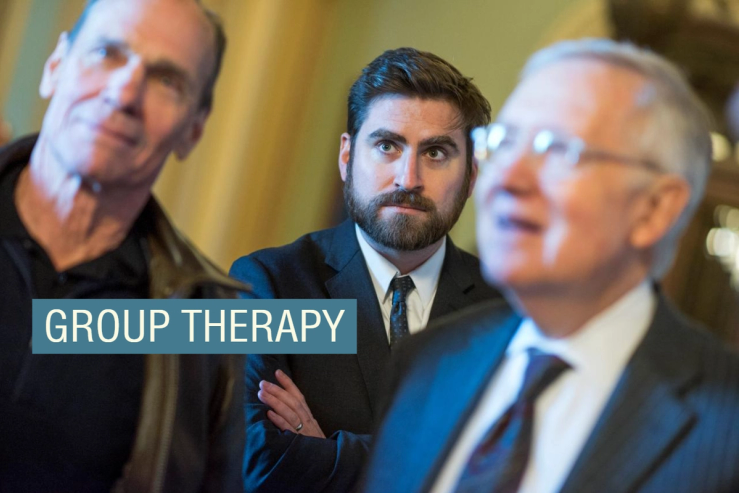Q&A
To defeat “the groups,” Adam Jentleson created one. A longtime Democratic operative with stints working for John Kerry, Harry Reid, and John Fetterman, Jentleson largely supported his party’s move to the left after Donald Trump’s first election.
He changed his mind after Trump’s second victory, viewing progressive groups as partially responsible for Republicans’ sweep in 2024. Those liberal organizations “prevent Democrats from thinking clearly about how to win,” Jentleson wrote in The New York Times.
Jentleson’s new group, the Searchlight Institute, is trying to build an incubator for popular ideas and “supermajority thinking” — battling the left-wing organizations which, he argues, badgered confused Democrats into positions that they can’t defend or run on. This is an edited transcript of our conversation.
David Weigel: Can you tell me about the origins of this? A lot of the ideas you blame for dragging down Democrats came from 2019 and the presidential primary, and at that time, you were supporting Elizabeth Warren.
Adam Jentleson: I think that 2016 broke a lot of people’s brains and rightfully upended a lot of the assumptions we had about how politics worked.
That was definitely true for me. For the first 15 years of my career, it was working for people whose issue positions were further to the right than my own. I just took it as a given that this was what people needed to do to win elections.
After 2016, watching the rise of Bernie, it was like — wait a minute. What if you could spark massive grassroots energy and turn out different kinds of voters by moving to the left? What caused that theory to be untrue was that there was never any evidence that moving to the left was what sparked additional energy among the grassroots.
Bernie 2016 was a pretty darn heterodox candidate, a classic populist who was left on economic issues, but further to the right than a lot of Democrats on cultural issues, whether it was guns or immigration or crime. He was rejected by the groups in 2016 and called them “the establishment.” I learned a lot after that.
Was there some particular election result that made you rethink that?
Somewhat in 2020, definitely in 2024. The people advancing that grassroots energy theory tended to be electoral underperformers themselves. When I was working in the Senate in 2009, when we had 60 senators, we had people like Blanche Lincoln and Ben Nelson who diverged from the party on several issues. They weren’t all the same issues.
That’s important. Searchlight is not going to be too prescriptive about telling people where they need to diverge. We’re telling people that you should have a heterodox mix of views. And one of our roles is to put out a large volume of intellectually honest, unbiased polling data that will illustrate where the American people are on a range of hot button topics.
Between 2016 and 2020, there was a lot of polling data being put out into the world that created a funhouse mirror image of what the American people actually thought, and dramatically overstated public support for a bunch of progressive policies.
You cite polling around student debt relief as an example of this. How do you avoid that bias problem?
It’s pretty easy to get a result that says 55% to 60% of people support a given issue, but that question does not tell you anything about how it plays in a political context. What is the salience? Who are the people who actually vote on this issue? How willing are people to make trade-offs for that issue, right? You’ll get people saying, 65% of voters say climate change is a major problem. But as soon as you start asking them if they’re willing to pay more to fight it, the support evaporates.
We have this Shark Tank model where we will pay people for three months to generate a policy idea. Move fast and break things. Put ideas out into the world. Emphasize creativity and entrepreneurship, and not getting a million stakeholders to sign off.
Did Democrats make decisions that candidates should be renouncing and moving away from?
On student loans, I don’t think they ended up in a good place. People have pretty different opinions of student debt forgiveness based on whether they think you’re doing a broad-based forgiveness or helping people going into public service. If you tried to craft, in a lab, a policy designed to illustrate that Democrats were the party that cared more about college-educated liberals than anybody else, you’d be hard-pressed to come up with something more blatant than student debt relief when working class people are suffering from inflation.
What do you say to people who think — great, you’re abandoning intersectionality and throwing some people under the bus? Specifically, I mean that by saying the ACLU made Democrats take an unpopular trans rights position, you’re throwing trans people under the bus.
We’re currently experiencing a generational rollback of trans rights, and trans people are more under threat than they’ve been in an incredibly long time. The people who are throwing trans people under the bus are the ones insisting that Democrats take maximalist positions, even if it causes them to lose elections to Republicans who then tear up these rights. I feel very strongly about that.
Where does foreign policy fit into this? Democrats are getting pulled in different directions on Gaza, groups that had access to funding are losing it over that issue.
This is all I will say about that, for now: AIPAC is a group, too.


